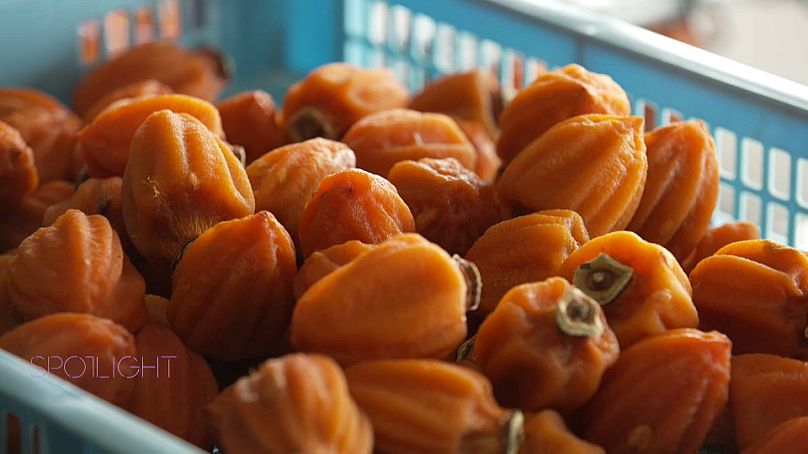Agriculture was hit hard by the Fukushima nuclear disaster and exports from the area collapsed. 11 years later, thanks to strict safety measures, they've resumed giving a much-needed boost to local producers and consumers.
Agriculture was one of the hardest-hit sectors after the Fukushima nuclear disaster in Japan 11 years ago.
Due to fears of contamination, food exports collapsed there. But today thanks to the strict safety measures taken by the country, they have now almost entirely resumed. That's great news for both local producers and for consumers around the world.
A sweet orange treat
In winter, blanketed white snow covers Isazawa, in the Fukushima prefecture. As the season changes, so too do the colours and a dazzling shade of orange sets over the countryside. The warm glow comes from the persimmon fields. Acre upon acre of land is dedicated to growing the fruit that has been harvested in recent months.
Junya Sato runs a family business that dries out persimmon to create Anpogaki, a sweet treat born in the Fukushima prefecture. He peels the fruit and lets it dry for two weeks for it to take on its iconic sweet scent.
The treat is known worldwide and according to Junya Sato, it has its own "specific sensation". Junya Sato used to sell three tonnes of Anpogaki a year. After the Fukushima disaster, production ground to a halt for two years.
It's a time he remembers with sadness, "producing Anpogaki was part of my daily life and when you’re told that you can’t do it for two years, you wonder what you can do instead."
Global food exports are an important part of Fukushima's economy. Products from there and neighbouring prefectures were originally restricted by 55 countries and regions amid contamination fears. Now, thanks to stringent safety measures, 41 countries have fully lifted restrictions.
Stringent checks
A dedicated testing facility at the Yanagawa Agriculture Centre checks up to 5000 boxes of Anpogaki a day. None of them can exceed 50 Becquerels, the unit used to measure radioactivity. Any that go over that measure are thrown out along with the rest of the box.
But safety tests go even further, right to the roots of the Anpogaki. The trees that bear the fruit are thoroughly checked too. 8000 trees have already been felled because they are too contaminated.
Anpogaki is just one of many products being enjoyed around the world again. At the Fukushima Agricultural Technology Centre, the regional inspection centre, they examine everything from beef to mushrooms. They require all products to meet safety levels 10 times stricter than global standards.
Okazaki Kazuhiro, the Director there says "they are strict controls, and security and safety are achieved. We want people to be reassured by this. Only products which have been cleared can be distributed. This is the protocol we’ve built."
Safety inspectors also say it’s extremely rare for a product not to pass the tough standards.
A recovering sector
The US has highlighted "Japan’s robust control measures" as the reason why it has scrapped all its import restrictions. After 10 years of sampling, it says there’s a "very low risk" to American consumers.
With Australia’s food sample results "well below guidelines," it has also stopped its measures too and Canada says "no additional testing" is planned after ending its restrictions.
This is great news for local producers. In Isazawa, Junya Sato is hoping the remaining export restrictions will end soon, which will help him to boost his business further. To him, it's a great motivation that the agriculture sector in Fukushima is getting back on track.












